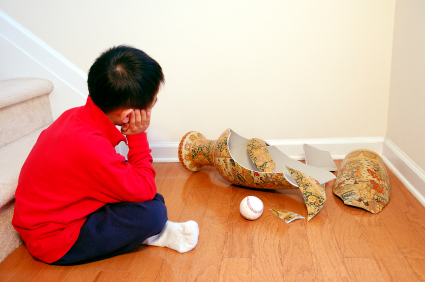
Dennis and I recently spent some time with our son Samuel, his wife, Stephanie, and their three beautiful children. Watching the two of them interact with these precious kids, especially their two sons who look so much like Samuel did as a little guy, I couldn’t help but notice how intentional they are in the day-to-day job of parenting. They are teaching lessons with many of their moment-to-moment interactions. It reminded me of an important choice I made when Samuel was much younger. …
When I heard the crashing sound in the other room, I knew something had broken. As I went to investigate, I saw “Little Apple Girl” had developed a split personality, and her remains were scattered on the living room floor. I quickly thought of my grandmother, who had purchased the Hummel figurine in Germany in the early 1930s. I had received it after her death. It was a treasure, and so I proudly displayed it on a bookcase shelf high above the reach of little hands.
Clearly my assumption of safety was flawed.
A few months earlier, we thought we had a sudden windfall. I’ll never forget the day I saw the advertisement in the newspaper: “Come see the Little Apple Girl Hummel exhibit,” it read. Interested, I scanned the ad and discovered that “Little Apple Girl” was worth $15,000.
I called Dennis, and he immediately started talking about selling it and buying a bass boat. No way. I put it up on a higher shelf — supposedly in a safe spot. (Later we learned that our figurine was just a “bit” smaller; the one on display was three feet tall, and mine was only four inches and only worth $150!)
Before I even discovered what had broken, my first emotion was anger. I felt like wringing the necks of my two young sons; I had just reminded them not to throw balls in the house. It was a standing rule they both knew.
When I arrived at the scene of the crime, I found the guilty party, Samuel, who was about five years old. I told him to go sit on his bed because he knew he’d disobeyed. And I needed to think.
As I picked up the pieces and determined I could glue it back together, I evaluated what I needed to say and do. What I said communicated what I valued.
Holding the broken figurine in my hand, I went to Samuel’s room, took his precious blue-eyed, blond-haired face in my other hand, and said, “Do you see this?” His eyes became little blue saucers, wondering about his fate.
He nodded. His eyes met mine and I made my point: “I want you to know, Samuel Rainey, that I love you more than this little statue. You are more important to me than this.” Glancing down at the remnants I cradled in my hand, I went on: “And I love you enough to spank you for disobeying me.”
I don’t know if Samuel remembers that day or not, but it was a victory for me, a milestone in valuing my children over my things. And the reason it was a victory is because I had failed many times before as my children, in their childishness, had made endless messes and had broken many other things. Too often, I had just reacted out of my own hurt and loss, not realizing I was modeling the wrong values to my kids. I learned that day that making good decisions in hard situations requires taking a few minutes or longer if needed to think through what is at stake in the long term. People are more important than cleanliness, order, and the things I valued personally. That day, I acted on what I believed and not on how I felt.

Barbara, thank you so much for sharing this today. It seems like with two little boys, something is always getting broken around here. And unfortunately, I often don’t handle it in a way that reflects that my children are my true treasure. Thank you for this powerful reminder!
Thank you so very much! What a beautiful reminder to teach my children how precious they are to me even in all those broken moments of the day. You always encourage me so much!
You see the chewed up puzzle piece, book spines made into chewing gum, and the broken flashlight through the screen, can’t you? *sigh* good words!
Thanks so much for this! It’s not easy to keep your cool when you lose something precious , but the lessons taught at such times are more precious.